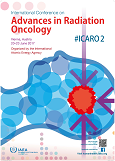Speaker
Alfonso Varela M
(Brazilian Cancer Foundation)
Description
The Master's degree course in Medical Physics currently in progress is a joint effort of the Cancer Foundation and the State University of Rio de Janeiro is one of the components of the National Education Program in Radiotherapy. The purpose of this program is to train, qualify and update professionals, linked to public, philanthropic or private therapy centers, which treat patients from the Brazilian Health Care System (SUS). The project is financed by the Ministry of Health through spontaneous donations from companies and individuals specifically to the National Program to Support to Cancer Oncology (PRONON).
This program aims to train 21 medical physicists during the period 24 months to work in Radiotherapy. This effort is intended to help to minimize the present gap of qualified medical physicists in Brazil that will be increased after the installation of 80 new Linacs within the next 3 years in different areas of the country.
The total workload of the course is of 5588 hours was divided in 635 hours of academic education and lab work and 4853 hours of experience in a clinical environment.
An academic infrastructure for the development of the Project was installed and each student was awarded with a fellowship, a laptop with a treatment planning system installed and internet access to reference paper, lectures and clinical cases. This paperless Project allows a direct interaction of the students and professor with the coordination of the Project, and all exams, lab reports, homework are loaded into the managing software called Tandle (Teach and Learning).
For the practical activities, several agreements were signed with major cancer centers in order to allow the students the use of their facilities and equipment for the training and work in close cooperation with the local staff.
An academic staff of 37 teachers (15 PhDs, 11 Masters, 9 Bachelor's and 4 technicians) the majority from Rio de Janeiro was selected in order to cover the different topics of the program.
The academic, theoretical and practical activities are distributed in eight modules with an increasing level of complexity:
Module I: (# hours)
• Anatomy and Physiology- 40
• Sources of Radiation -35
• Statistics and Epidemiology- 40
• Radiation physics and Dosimetry - 50
• Nuclear Instrumentation I (Basic Principles) - 50
• Nuclear Instrumentation II (Laboratory - Practical) - 40
• Imaging Physics- 50
• Radiobiology-50
• Nuclear Instrumentation III (Practical Applications) - 40
• Measurement Uncertainty - 40
• Physical Basis of Radiotherapy levels I and II - 120
Module II
• Physical Basis of Radiotherapy level III - 48
• Physical Bases of the TPS algorithms - 48
• Quality Control of TPS and Management Systems -48
• Treatment Simulation -4 0
• Training with the TPS with several real patient data - 296
a. Treatment Planning of 2D, 3DCRT, IMRT, VMAT and SRS
b. Brachytherapy HDR
• Radiological Protection - 25
• Shielding calculation of a 6 MV Photon and a HDR rooms) - 40
• Quality Assurance in Radiotherapy - 48
The 6 remaining modules of about 15 weeks are specific to the training in the clinical environment with a workload of 60 hours/wk. The local Physicist (preceptors) Board Certified by the Brazilian Association of Medical Physics (ABFM) supervises all activities.
After each module, the students return to the Cancer Foundation for a week of discussions based on their of the reports and the following week, 1 short course of 40 hours in different topics as listed below:
1. Dosimetry procedures and international protocols- TRS#398
2. Commissioning, modeling and data validation of TPS (Treatment Planning Systems)
3. Quality assurance in IMRT
4. Small field dosimetry
5. Safety Culture and Risk Analysis
Those courses are mandatory for Master students and open to up to 20 physicists from different parts of the country already in the field.
The activities of the trainees are guided by a script previously established by the coordination, whose objective is to focus in the clinical training. The student shall elaborate reports on the performed activities, to allow the program coordination to evaluate their evolution during the training.
The emphasis of the clinical training in the radiotherapy centers have been planned as follows.
Clinical Module I: Dosimetry and linear accelerator quality control
Clinical Module II: Treatment Planning of 2D and 3DCRT clinical cases and the respective QA.
Clinical Module III: Treatment Planning of clinical cases 3DCRT, IMRT VMAT and the respective QA
Clinical Module IV: Treatment Planning of clinical cases in Brachytherapy and the respective QA
Clinical Module V: Treatment Planning of clinical cases involving radiosurgery, SBRT and the respective QA.
Module VI A general review of the course and prepare the students to take the Board Certification Exam by the ABFM and the National Regulatory Agency.
Finally, during the 24 months, the students will develop a small Project to be presented before a Committee.
| Institution | BRAZILIAN CANCER FOUNDATION |
|---|---|
| Country | Brazil |
Author
Carlos E Almeida
(Brazilian Cancer Foundation)
Co-author
Alfonso Varela M
(Brazilian Cancer Foundation)

